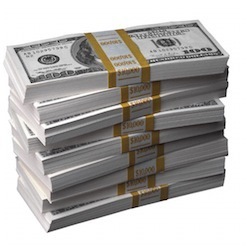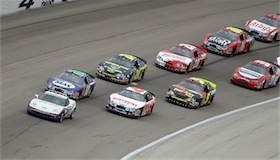Matthew Yglesias's Blog, page 2517
October 27, 2010
Our Heated Discourse
I'm not all that interested in in the details of John Burns' response to critics of his somewhat critical profile of war-critic Julian Assange, but I did think this was interesting:
Burns said he doesn't "recall ever having been the subject of such absolutely, relentless vituperation" following a story in his 35 years at the Times. He said his email inbox has been full of denunciations from readers and a number of academics at top-tier schools such as Harvard, Yale, and MIT. Some, he said, used "language that I don't think they would use at their own dinner table." Such heated reactions to the profile, Burns said, shows "just how embittered the American discourse on these two wars has become."
I think this shows less about American discourse on these wars than it does about how isolated from criticism writers at prestigious journalistic outlets have traditionally been. I don't think American discourse about parking regulation or the definition of insider trading or the wisdom of consumption vs income taxes has become particularly embittered in recent years. Nevertheless, some of the responses I get over email and in comments to my posts on those subjects gets extremely vituperative.
A lot of people just like to be vituperative on the Internet. What's more, for any given stance you can take on a political issue there's always going to be someone who disagrees with you. For example, yesterday I found out that someone thinks Robert Greenwald is a huge sellout who recently "revealed himself as the sort of mendacious but quotidian monster who belongs lumped in with [Ezra] Klein, Yglesias, McArdle and Krauthammer. A real embodiment of the Compleat Suck.™ Someone I'd introduce to Guevara with the evidence in hand." Weird, huh?
Well at least I think it's weird. But it's the world we live in and I suspect it's the world we've always been living in, but the advent of modern communications technology makes other people's reactions to your work much easier to find.


Vote Less, Judges Edition

(cc photo by srqpix)
Adam Serwer, Radley Balko makes the case that elected judges lead to bad criminal justice policy:
How to reverse or ameliorate the damage already done is a debate we'll be having for decades. But there is one change that could at least stop the bleeding: less democracy. As New York Times reporter Adam Liptak pointed out in a 2008 article, America's soaring incarceration rate may be largely due to the fact that we have one of the most politicized criminal justice systems in the developed world. In most states, judges and prosecutors are elected, making them more susceptible to slogan-based crime policy and an electorate driven by often irrational fear. While the crime rate has fallen dramatically since the early 1990s, polls consistently show that the public still thinks crime is getting worse.
I agree with that, but as I've said before I think there's a much broader issue of too many elected officials in America. And I don't think this should be understood as a call for "less democracy." The United Kingdom is a democracy. But a resident of London votes for a borough councillor, a member of the London Assembly, a mayor of the city, a member of parliament, and a member of the European parliament. A resident of New York City votes for a city council member, a mayor, a public advocate, a city comptroller, a district attorney, a state assembly member, a state senator, a governor, a lieutenant governor, a state comptroller, a state attorney general, a member of the US house, two US Senators, and the President. Then on top of all that he votes for judges!
And you have to ask yourself—is all that voting better described as "more democracy" or as "people voting in a lot of elections they're not realistically going to know anything about"? I'm going to take what's behind door number two. There's no point in holding elections that just consist of ignorance punctuated by the odd burst of demagoguery.


A Hero of Our Time
Congressman Ron Kind, Democrat of Wisconsin, as quoted in ProPublica's article on the House "New Democrat" Caucus:
At a Saturday session at the retreat, Rep. Kind acknowledged what had brought the lobbyists and lawmakers together. In these busy legislative times, he said, the New Democrats had become a "powerful voice in policy making," and the business interests in the room were playing a crucial role in informing that voice.
"We're working hard with you to get the policy right," Kind told lobbyists for the U.S. Chamber of Commerce, JPMorgan, Goldman Sachs and others.
Political junkies in the audience will note that Kind seems to be endorsing the Hall/Deardorff "Lobbying as Legislative Subsidy" (PDF) model rather than the more populist "pols on the take" model. And it doesn't really sound much less pernicious this way!


CEO Pay, What Is To Be Done?
I basically agree with Kevin Drum about CEO pay. My pet evidence would be that entrepreneurial founder-managed firms (think Google) have very different pay structures in which you actually only get rich if the company does well. But where these discussion tend to lose me is at the "what is to be done" phase.
The best possible policy remedy to giant, seemingly undeserved increases in CEO pay, is some kind of sharply progressive consumption tax. But then again that would be the best policy response to well-deserved increases in CEO pay as well. Progressive taxation to finance useful public services and a modicum of cash grants to the poor is welfare-enhancing. The case for progressive taxation as a welfare-enhancing measure is strong when inequality goes up. And a tax base of consumption is more economically efficient than a tax base of income. What's more, there are a number of policy measures—increased openness to immigrants and to foreign products—that would increase economic growth and decrease global poverty, but might further increase US inequality. All this makes for an extremely compelling case for heavy taxation of lavish consumption by rich people.
I think there are probably measures we could take to strengthen corporate governance, though I don't know as much about this. But the way to assess a proposal to improve corporate governance is to ask whether the proposal would, in fact, improve corporate governance. Either way, like the tax argument, the case for any specific proposal would stand more-or-less independently of the issue of whether or not all or most CEOs are in some sense overpaid.


The Mighty Talons of the Climate Hawks
I don't really have much to say about it, but I've spent the past few days being taken in by Dave Roberts' effort to popularize the concept of "climate hawks" so I thought I should do my part.
What's a climate hawk? Well of course much like a deficit hawk or a national security hawk or an inflation hawk, a climate hawk is tough-minded and awesome and entitled to worshipful media coverage. We're very serious people who want to confront the major challenges of our time. Are we environmentalists? Perhaps. But many of us aren't really "nature-lovers," we just think it would be unfortunate if low-lying areas were flooded, while vast new regions of the earth are stricken with drought. We recognize that the particulate pollution from burning coal and the geopolitical consequences of oil dependence are both dire enough to make a compelling case for energy reform even apart from the greenhouse gas issue.
We think it's unfortunate congress didn't pass a comprehensive climate bill, but we're determined to do the best we can with EPA regulation and hope responsible people recognize that it'll be better for everyone if congress takes another bite at this. And we're hoping for a serious bite. After all, we're climate hawks!


FA Hayek, Statist

(cc photo by Salim Virji)
Karl Smith observes that, somewhat amusingly, in The Road to Serfdom Hayek ends up committing himself to a view of environmental regulations that's well tot he left of where today's center-left politicians are:
Nor can certain harmful effects of deforestation, or of some methods of farming, or of the smoke and noise of factories, be confined to the owner of the property in question or to those who are willing to submit to the damage for an agreed compensation. In such instances we must find some substitute for the regulation by the price mechanism. But the fact that we have to resort to the substitution of direct regulation by authority where the conditions for the proper working of competition cannot be created, does not prove that we should suppress competition where it can be made to function.
Of course the correct free market riposte to this proposal is that we can create a price mechanism. So instead of having the guys in the EPA building try to tinker with everyone's factories, we could establish a legislative ceiling on the quantity of greenhouse gas emissions we're willing to tolerate and then allocate permits to do it. That way the price mechanism—à la "the use of knowledge in society"—will be able to uncover the most economically efficient way of undertaking the reductions. But I guess Big Government Hayek doesn't think that will work.
At any rate, I do think this is the issue that's been underplayed in a lot of recent discussions of the institutional right's funding sources. We've reached a point in the history of the world when the regulation of air pollution has become a first-tier political issues. And it's naturally a controversial one since a lot of money is at stake. But there's simply no support anywhere in the classical liberal tradition for the idea that an unrestricted right to pollute the air is part of "free markets" or any coherent conception of liberty or property rights. And yet opposition to carbon pricing and emissions regulations has become an article of faith across the American right. Some of that is political opportunism, some of it is ignorance, but a lot of it is the impact of corporate cash, especially from the extractive industries.


October 26, 2010
Endgame
Make it all seem worthwhile:
— "If we could guarantee 5 percent NGDP growth for several years, it would be great."
— Barack Obama's not-so-hot plan to beat a GOP congress.
— Gas tax.
— Tweaking the area median income formula doesn't change the fact that you need to increase supply to make housing cheaper.
— How elite are you? I got 13 "elite" answers.
Husker Du does "Love Is All Around" (aka the Mary Tyler Moore Show theme song).


What Price Bananas?
I really want to teach Scott Sumner to write shorter blog posts, because this throwaway paragraph embedded in a larger argument I don't really agree with is great on its own:
[S]uppose we had been gladly importing Ecuadorean bananas for decades, naively thinking that any country named after the equator must be warm. Then we found out that the weather in Ecuador was actually quite cool (due to high altitude), and that bananas could only be grown there because the government was heavily subsidizing production in greenhouses. Of course most red-blooded Americans would be outraged by this discovery, as it would indicate that we were a bunch of patsies who had been victimized by the Ecuadorean "dumping" of subsidized goods. A few economists might argue, however, that if cheap bananas are good for the US, it doesn't really matter why they are cheap.
Incidentally, I have in fact seen a government-subsidized greenhouse in Iceland where they were growing tropical flowers and citrus fruit:
I hope—but don't dare assume—that the Icelandic government is rethinking some of its agricultural policies in the wake of their bubble collapse. The US has some irrational approaches in this regard, but it's nothing compared to what they were up to.


NBA Season Preview
First off let me start by thanking Wizards owner Ted Leonsis for correcting my error in an earlier post. I wrote "Pollard family" when it should have been "Pollin." The Pollins have been pillars of this community since long before I lived here, so I feel unusually bad about this typo.
More broadly, I'm afraid I'm going to have to say that the outlook for the Wizards as the NBA season begins is extremely bleak. Projections for this to be a somewhat below-average squad involve being (a) unduly optimistic about the recovery of Gilbert Arenas' knees, (b) unduly optimistic about the performance of John Wall, and (c) probably too optimistic about how good Arenas ever was. Last year's team was bad, and we've now lost a lot of players who were solid contributors. Wall would have to do something totally unprecedented to raise this team to anywhere other than awful. I should note that I say this not out of specific John Wall skepticism, but simply to note that now that very talented prospects don't stay in college for very long rookies tend to be pretty bad. LeBron James and Kevin Durant both lived up to the hype—eventually—but as rookies were just guys who took and missed a ton of shots.
Beyond that, I agree with Arturo Galletti that the injury to Mike Miller is a bigger blow to the Heat than might be clear at first glance. The way this squad is put together there's very little room for error. I think questions about LBJ, Wade, and Chris Bosh "coexisting" are overblown. The Eastern Conference playoffs will, however, give us a good look at how much matchups matter since I don't see anyone on this team who's going to defend Dwight Howard successfully.
The other thing I think people are kind of sleeping on is the Portland Trailblazers. This was a good team last year—fifty wins—and I don't think their injury situation is going to get worse. What's more, this is a squad that, if healthy, has the size and depth to match up with the Laker bigs.


We Are All Pointy-Headed Elites
Via James Downie, it turns out that not only is Charles Murray generally full of it, but elitism is on the rise as NASCAR ratings mysteriously plummet:
"The simple fact is that people just are not tuning in," said Julie Sobieski, ESPN's vice president of programming and acquisitions. "We're looking at everything to find out why."
Top ESPN executives, including president George Bodenheimer, traveled to Charlotte for the fifth race of the Chase, the Bank of America 500, and engaged NASCAR executives during several meetings. A team of ESPN's top editorial staff, including Rob King, ESPN digital media editor-in-chief, and Glenn Jacobs, senior coordinating producer of SportsCenter, also attended the race and were given a three-day, behind-the-scenes immersion into NASCAR operations.
Obviously, Barack Obama's sharia socialism is to blame here. Decent people worry that if they watch NASCAR, their parents will be sent off to the death panels.
Meanwhile, David Frum has a good post on Murray and the real American elite.


Matthew Yglesias's Blog
- Matthew Yglesias's profile
- 72 followers










